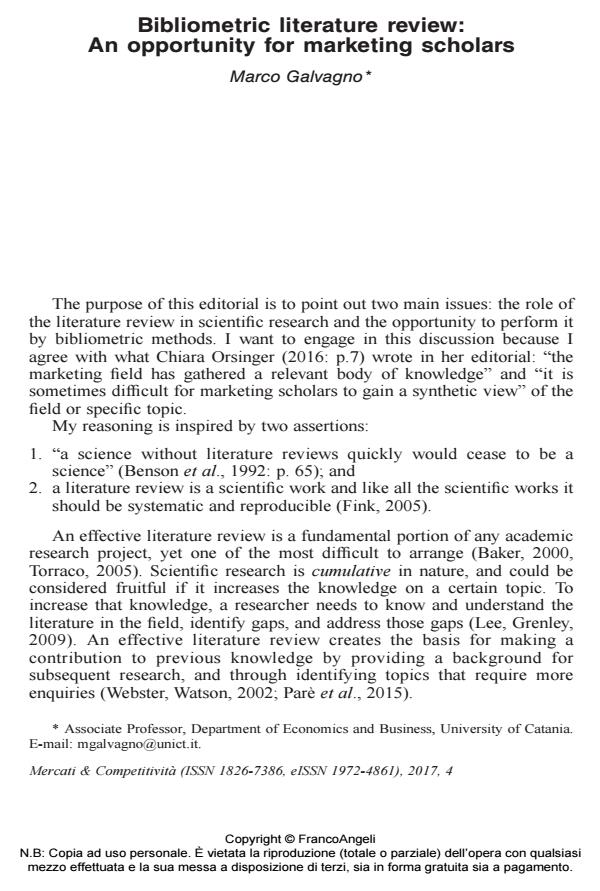Bibliometric literature review: An opportunity for marketing scholars
Titolo Rivista MERCATI & COMPETITIVITÀ
Autori/Curatori Marco Galvagno
Anno di pubblicazione 2017 Fascicolo 2017/4
Lingua Inglese Numero pagine 9 P. 7-15 Dimensione file 77 KB
DOI 10.3280/MC2017-004001
Il DOI è il codice a barre della proprietà intellettuale: per saperne di più
clicca qui

FrancoAngeli è membro della Publishers International Linking Association, Inc (PILA), associazione indipendente e non profit per facilitare (attraverso i servizi tecnologici implementati da CrossRef.org) l’accesso degli studiosi ai contenuti digitali nelle pubblicazioni professionali e scientifiche.
- A Bibliometric Analysis of Gamification Research Manuel Trinidad, Mercedes Ruiz, Alejandro Calderon, in IEEE Access /2021 pp.46505
DOI: 10.1109/ACCESS.2021.3063986 - The Experience Logic as a New Perspective for Marketing Management Fabio Forlani, Andrea Buratti, Tonino Pencarelli, pp.15 (ISBN:978-3-319-77549-4)
- A Bibliometric Map of Intellectual Communities in Frugal Innovation Literature Viviana DAngelo, Mats Magnusson, in IEEE Transactions on Engineering Management /2021 pp.653
DOI: 10.1109/TEM.2020.2994043 - Big Data Analytics in Logistics and Supply Chain Management: A Review of Literature Prathmesh Vasant Pawar, Ratna Achuta Paluri, in Vision: The Journal of Business Perspective 09722629221091655/2022
DOI: 10.1177/09722629221091655 - Technological advancements and challenges in food supply chain management: a scientometric analysis Amit Kohli, Kariyapperuma Mudiyanselage Keshika Erandi Kumarihami Rekogama, Lokeswar Rao Bodasingh, Sriram Ananthan, Thirupathi Manickam, Dhanabalan Thangam, in British Food Journal /2025 pp.3303
DOI: 10.1108/BFJ-09-2024-0944 - Using big data for co-innovation processes: Mapping the field of data-driven innovation, proposing theoretical developments and providing a research agenda Stefano Bresciani, Francesco Ciampi, Francesco Meli, Alberto Ferraris, in International Journal of Information Management 102347/2021 pp.102347
DOI: 10.1016/j.ijinfomgt.2021.102347 - A bibliometric analysis on oil and gas pipeline failure consequence analysis Armin Aalirezaei, Golam Kabir, in Innovative Infrastructure Solutions 230/2021
DOI: 10.1007/s41062-021-00591-0 - Green Supply Chains and Digital Supply Chains: Identifying Overlapping Areas Viviana D’Angelo, Valeria Belvedere, in Sustainability /2023 pp.9828
DOI: 10.3390/su15129828 - Assessing the state of seahorse research through scientometric analysis: an update Thirukanthan Chandra Segaran, Hani Amir Aouissi, Mohd Iqbal Mohd Noor, Mohd Effendy Abd Wahid, Fathurrahman Lananan, Alexandru-Ionut Petrisor, Mohamad Nor Azra, in Reviews in Fish Biology and Fisheries /2023 pp.1237
DOI: 10.1007/s11160-023-09794-3 - Knowledge mapping and visualization of personal information management literature, 1988–2020 Williams Ezinwa Nwagwu, Chidiebube Blossom Williams, in IFLA Journal /2022 pp.598
DOI: 10.1177/03400352211065487 - Frugal Approaches to Innovation: Industrial Settings and Innovation Strategies Viviana D'Angelo, Mats Magnusson, in IEEE Engineering Management Review /2022 pp.88
DOI: 10.1109/EMR.2022.3171133 - Principal resilience research from its birth in 2005 to 2024: A narrative review and a conceptual framework Junjun Chen, in Educational Management Administration & Leadership 17411432241294170/2025
DOI: 10.1177/17411432241294170 - The other "meta" of meta-analysis: Qualitative and text-based approaches to "analysis of analyses" in marketing Ksenia Silchenko, in MERCATI & COMPETITIVITÀ 4/2018 pp.27
DOI: 10.3280/MC2018-004003 - A comprehensive review of Maritime Bibliometric Studies (2014–2024) Andro Dragović, Nenad Zrnić, Branislav Dragović, Maxim A. Dulebenets, in Ocean Engineering 118917/2024 pp.118917
DOI: 10.1016/j.oceaneng.2024.118917 - Society and Sustainability Philipe Lira de Carvalho, Mariana Lima Bandeira, Airton Cardoso Cançado, pp.185 (ISBN:978-1-83608-501-0)
- COVID-19 Pandemi Döneminde Pazarlama Literatüründeki Eğilimler: Bibliyometrik Analizle Bir İnceleme Resul ÖZTÜRK, in OPUS Uluslararası Toplum Araştırmaları Dergisi /2020 pp.1
DOI: 10.26466/opus.788120 - Supply chain risk and resilience in startups, SMEs, and large enterprises: a systematic review and directions for research Arsalan Safari, Vanesa Balicevac Al Ismail, Mahour Parast, Ismail Gölgeci, Shaligram Pokharel, in The International Journal of Logistics Management /2024 pp.680
DOI: 10.1108/IJLM-10-2022-0422 - Survive and Thrive in the Time of Changes: A Bibliometric Review of Teacher Resilience, 1998–2023 Xinlin Li, Junjun Chen, in Review of Educational Research /2026 pp.176
DOI: 10.3102/00346543241293786 - Indigenous Knowledge and Disaster Risk Reduction Noorika Retno Widuri, Tupan, Ambar Yoganingrum, Rulina Rachmawati, Nana Sulaksana, Zufialdi Zakaria, pp.229 (ISBN:978-3-031-26142-8)
- The Experience Logic as a New Perspective for Marketing Management Tonino Pencarelli, Marco Cioppi, Ilaria Curina, Fabio Forlani, pp.169 (ISBN:978-3-319-77549-4)
- Mapping the Circular Economy Concept and the Global South Leticia Sarmento dos Muchangos, in Circular Economy and Sustainability /2022 pp.71
DOI: 10.1007/s43615-021-00095-0
Marco Galvagno, Bibliometric literature review: An opportunity for marketing scholars in "MERCATI & COMPETITIVITÀ" 4/2017, pp 7-15, DOI: 10.3280/MC2017-004001